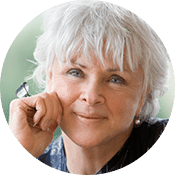In Part 2 of our interview with Byron Katie (Part 1 appeared in last month’s Books column), Parvati Magazine’s Wellness Editor Dr. Karen Ho discusses The Work and Katie’s latest offering, A Mind at Home with Itself.
Parvati Magazine: You awoke spontaneously, and The Work was born, this process of intense self-inquiry and the dissolution of the self. Do you believe that you had done anything to precipitate this awakening?
Byron Katie: For years I was feeling desperate and suicidal, filled to the brim with self-loathing. Things came to a head one day when I started screaming and couldn’t stop. Finally I checked myself into a halfway house for women with eating disorders. It was the only medical care my insurance would pay for. About a week later I had this experience of waking up to reality. It was pure grace born into awareness. I had done nothing to prepare for it and nothing to deserve it.
PMAG: The notion of the self – this limited construct of a separate being – is a barrier to experiencing enlightenment as you described, and freedom from suffering. Yet, can we truly live in our world in its current state in a self-less way?
BK: Yes. It happens naturally. As we question our stressful thoughts about others, ourselves, and the world, the self begins to shed its identity. When the mind is met with understanding, selflessness is the natural result. You sit in the daily practice of inquiry and automatically there is less self, and in that falling away of identity there is less to take care of and more for others who need it.
PMAG: Let’s talk more about generosity, which is a core theme in your recent book A Mind at Home with Itself. What is generosity for you? Can you describe what you mean by “compassion is selfishness”?
BK: When the mind is clear, it understands that there is no such thing as a self or another. So when I serve others, I’m always serving myself, because the others are me. That’s what I mean when I say that compassion, or any form of generosity, is selfishness. In the book I use the example of breastfeeding to make it clear. Generosity is natural and beyond a “doing” when it doesn’t include a past and future to obscure what is real, now. When you’re being generous and giving something with your whole heart, you’re simply not aware of any generosity. You’re not self-conscious. In fact, you would laugh if someone called you generous; it would seem ridiculous. When a mother breast-feeds her baby, does she think, “How generous of me!”? Usually that would be the furthest thing from her mind. Giving to her baby is giving to herself.
PMAG: You also say that everything, even something as seemingly real and visceral as physical pain, is imagined, a product of the mind. There are so many who live with chronic pain. Does living with chronic pain have to equal suffering?
BK: No. Pain is a physical experience, suffering a mental one. You can feel pain without suffering from it at all. And, as I say in the book, even physical pain is imagined. When you’re asleep, does your body hurt? When you’re hurting, and the phone rings, and it’s the call you’ve been longing for and you’re mentally focused on the conversation, is there any pain? If your thinking changes, the pain changes. The more still your mind becomes, the more you can see that pain is a projection of mind. If you observe it closely, you’ll see that it never really arrives; it’s always either anticipated or remembered. So, if you aren’t remembering the imagined pain that you are anticipating, where does the pain exist? Pain is happening on the surface of perception, while underneath it is the vast ocean of joy.
PMAG: When we shed these stories, what is left?
BK: I sometimes say that all that’s left is gratitude and laughter. As for people’s fear of not knowing, that becomes radically less as they do The Work. Inquiry is a practice. It’s a way of becoming intimate with the don’t-know mind, the mind in harmony with the way things are, the mind that is open to infinite possibilities. Of course you don’t know what you’ll encounter. That’s the point! Once you understand your true nature, you understand the nature of everyone and everything, and in this understanding there’s no need for the mind to perceive a future at all, since knowing has become completely unnecessary. You don’t know, nor do you need to know, what you’ll encounter next week, or tomorrow, or a nanosecond from now, as control has become unnecessary. Eventually you discover that total loss of control is the ultimate freedom. It’s a joyous experience.












